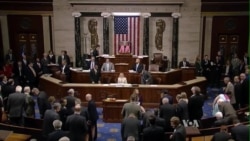While President Barack Obama discussed trade and other matters with his G7 counterparts in Germany, the fate of two blockbuster international trade pacts could hinge on an upcoming vote in the U.S. House of Representatives.
The United States is the lynchpin of proposed trade pacts spanning the Atlantic and the Pacific, but Washington is far from unified on authorizing simple yes-or-no congressional votes to approve them. It remains to be seen whether a bipartisan majority will emerge to pass trade promotion authority (TPA) that would facilitate congressional approval of a Pacific Rim as well as a trans-Atlantic free-trade accord.
“We’ve passed TPA in the Senate, and we’ve got an important vote coming up in the House,” said Congressman Pat Tiberi, who delivered the Republican Saturday address. “The world is engaging and trading like never before, and we must pass TPA so we will not be left behind.”
But Republicans will need more than token Democratic backing, and so far fewer than 20 House Democrats are on record supporting TPA.
“I can tell you it’s a very large number in our caucus that is not supportive of it,” said Minority Leader Nancy Pelosi at the end of last week.
Pelosi put the burden of passing TPA on Speaker John Boehner. “It’s absolutely the speaker’s responsibility. It’s where the support exists: in his caucus. He has the majority,” she said.
But Boehner is doing some finger-pointing of his own, saying if President Obama wants trade deals, he needs to convince fellow-Democrats to support them.
“We’re working to get trade promotion authority finished. I talked to the president,” said Boehner. “He’s got some work to do, too.”
The White House believes TPA will pass. Spokesman Josh Earnest expressed cautious optimism last week.
“Based on the success that we had in convincing nearly a third of Senate Democrats to support this legislation, we are optimistic that we have the opportunity to make the case to progressives across the country and to Democrats in the House, and we can give them a reason to support this bill,” said Earnest.
The proposed trade pacts have the firm backing of America’s business community, but are strongly opposed by labor and environmental groups.











